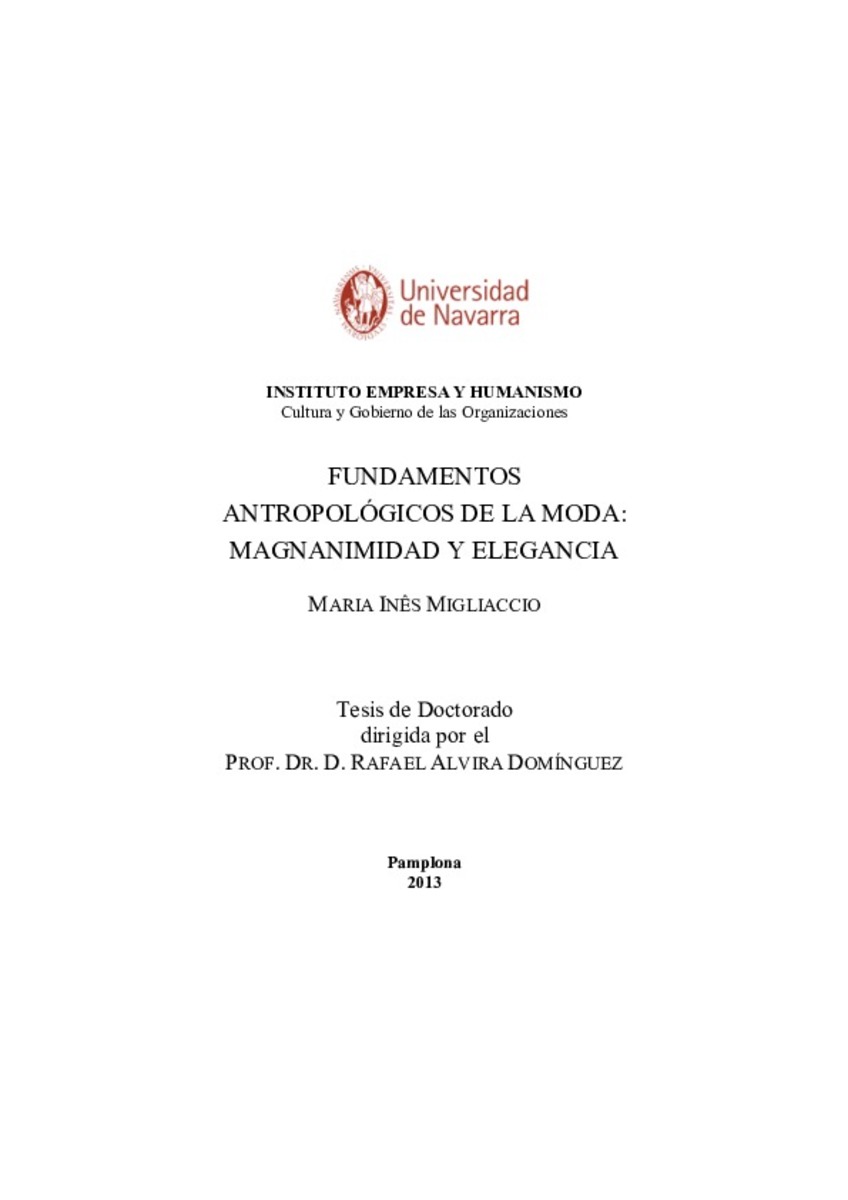Full metadata record
| DC Field | Value | Language |
|---|---|---|
| dc.contributor.advisor | Alvira, R. (Rafael) | - |
| dc.creator | Migliaccio, M.I. (María Inés) | - |
| dc.date.accessioned | 2013-05-09T10:36:22Z | - |
| dc.date.available | 2013-05-09T10:36:22Z | - |
| dc.date.issued | 2013 | - |
| dc.date.submitted | 2013-05-03 | - |
| dc.identifier.citation | Migliaccio, María Inés. “Fundamentos antropológicos de la moda: magnanimidad y elegancia”. Alvira, Rafael. Tesis doctoral. Universidad de Navarra, Pamplona, 2013 | es_ES |
| dc.identifier.uri | https://hdl.handle.net/10171/29186 | - |
| dc.description.abstract | Esta tesis trata de la magnanimidad y de la elegancia como virtudes fundamentales para el cumplimiento del papel insustituible de cada persona en el protagonismo de una moda digna y bella, que puede contribuir en mucho al desarrollo de una sociedad más feliz. Al profundizar en el presupuesto de que ‘las virtudes son para los hombres, lo que las instituciones son para la sociedad’, por medio de una relación novedosa entre los trascendentales metafísicos aristotélicotomistas: ser, bondad, belleza y unidad, y los trascendentales sociales que propone Rafael Alvira: historia, educación, cultura y civilización, descubrimos la grandeza de ánimo, el ornato de las virtudes: la magnanimidad, así como la capacidad de elegir lo mejor: la elegancia, como fundamentos antropológicos de la moda. Él análisis histórico-sociológico de cuatro pilares de este sector económico –los gestores, los creadores, los informadores y los consumidores de la moda– comprobó nuestra teoría, sintetizada por el perfil de sus más comunes manifestaciones y por los fenómenos que implican, como el tiempo, el espacio, el servicio, la fiesta, el lujo y, finalmente, el amor. | es_ES |
| dc.description.abstract | This thesis deals with magnanimity and elegance as fundamental virtues for the fulfilment of the irreplaceable role of each person in the prominence of a beautiful and worthy fashion, which can contribute to the development of a happier society. Upon deepening in the hypothesis that ‘virtues are for men, what the institutions are for society’, through a novel relation among the transcendental metaphysical aristotelian-thomistic: to be, kindness, beauty and unity; and the transcendental social that has been proposes by Rafael Alvira: history, education, culture and civilization, we discover the greatness of spirit, the adornment of virtues: the magnanimity, as well as the capacity of electing the best: the elegance, as anthropological bases of the fashion.The historical-sociological analysis of four pillars of this economic sector –the managers, the creators or designers, the communicators and the consumers of fashion– verified our theory, synthesized by the profile or their more common demonstrations and by the phenomena that imply, like time, space, service, celebration, luxury and, finally, love. | - |
| dc.language.iso | spa | es_ES |
| dc.publisher | Servicio de Publicaciones de la Universidad de Navarra | es_ES |
| dc.rights | info:eu-repo/semantics/openAccess | es_ES |
| dc.subject | Civilización | es_ES |
| dc.subject | Cultura | es_ES |
| dc.subject | Bondad | es_ES |
| dc.subject | Ser | es_ES |
| dc.subject | Virtudes | es_ES |
| dc.subject | Trascendentalidad | es_ES |
| dc.subject | Instituciones | es_ES |
| dc.subject | Sociedad | es_ES |
| dc.subject | Persona | es_ES |
| dc.title | Fundamentos antropológicos de la moda: magnanimidad y elegancia | es_ES |
| dc.type | info:eu-repo/semantics/doctoralThesis | es_ES |
Files in This Item:
Statistics and impact
Items in Dadun are protected by copyright, with all rights reserved, unless otherwise indicated.






